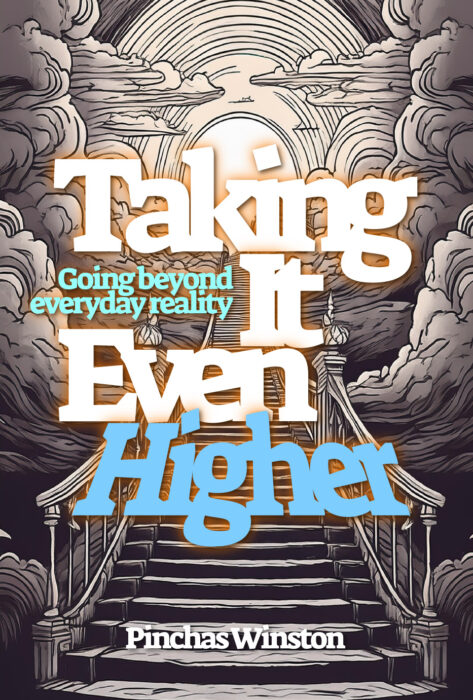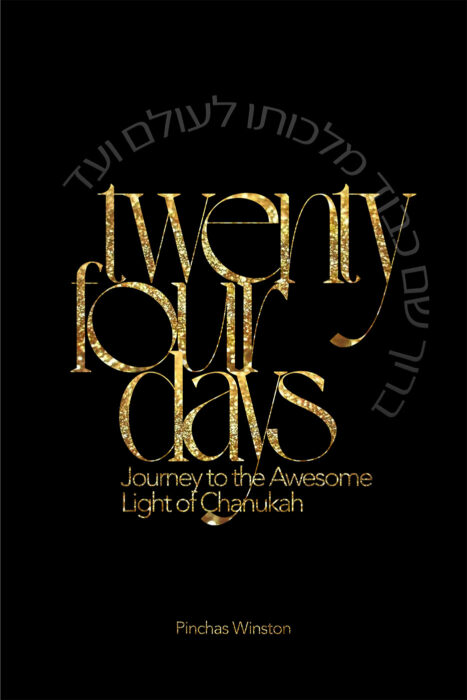Parashas Terumah, Issue #1086 – By Rabbi Pinchas Winston
Friday Night
WHEN ADAR COMES in, increase your joy, or at least that is what the Gemora tells us we should do. But as we all know, you can’t command an emotion. You can’t tell someone to love something they don’t, or hate something they don’t hate. The most you can do is tell a person to do something that will lead to the desired emotion, such as love, or hate as in the case with Amalek.
It’s Adar, so do happy things. For example, give terumah. Everyone knows that when you give tzedakah it makes you happy, and fortunately for people who want to be happy, there are literally thousands of worthy causes to which you can give your terumah. Don’t you feel happier already just knowing that?
So then why is giving tzedakah so hard to do? Is it in the giving itself? Is it the people who come collecting? This is how Rebi Alexandri used to put it upon completing his prayer:
Master of the Universe, it is known full well to You that our desire is to perform Your will. What prevents us? The yeast in the dough and the oppression of nations. (Brochos 17a)
Perhaps Rebi Alexandri was a tzaddik who naively thought that what was true for him was true for everyone else. More likely is that he was very astute and knew that what applied to him did apply to everyone else, including those people who had no problem identifying with their yetzer haras and therefore, thought the opposite.
There are basically three types of givers. There are those who give freely and generously, those who give because they know it is the right thing to do, and those who do not give and feel justified in not doing so. They might even be able to cite some halachah to back up their stinginess, but the bottom line is that they have a difficult time being generous with their money and possessions.
What makes a person stingy against their own good? Only one thing, and that is selfishness. They have a difficult time sharing what they value with others because they feel they will lose out. They might be happy to give you a cup of water since it flows quite freely from the tap. But when it comes to things they value but have to work for, they might find it difficult to give those things up because they believe their quality of life will go down.
It is not a coincidence that Purim is about giving. We give to people in need and we give to people who do not need. It is a holiday of giving more than any other. A terumah is an elevated offering, and Purim teaches us that through giving generously we actually elevate ourselves, and in doing so we elevate our level of joy and offer that to God, and it says, “Serve God with joy” (Tehillim 100:2).
Shabbos Day
THIS IS WHAT Rebi Alexandri understood and taught us. We are not stingy by nature. Our yetzer hara is. We are not selfish for our own good. Our yetzer hara is, for its good. The yetzer hara is only concerned about self-preservation, and only agrees to give up something if it will help with this, like assisting someone else because it will obligate them to assist us.
What is amazing is how easy and pleasurable it is to share with others when the yetzer hara has been neutralized. For example, if someone has a great day, they tend to be more generous. If someone is spared from a dangerous situation, they usually have a more generous spirit. And if we see someone else suffering and feel grateful that it is not us, we will happily help them out. If a person doesn’t, then they are really under the control of their yetzer hara.
On Purim, we use wine to make this point. We drink to neutralize our yetzer haras, and give the steering wheel to our souls. Not an actual steering wheel mind you, since you should not be driving while under the influence. But if you do it right, turning the drinking into a holy experience not a social one, then you can reach spiritual heights like no other time of the year.
The trouble is that so many get it wrong. They drink to get drunk, not drunk to get spiritually higher. Because of this, many reject drinking on Purim to such a degree, and a lot of rabbis support this, pointing out that taking a nap suffices to fulfill the mitzvah. Drink a little to make you sleepy, head for the sofa, and get some shuteye, during which you will certainly not know the difference between blessed Haman and cursed…ah…I mean blessed Mordechai and cursed Haman.
Personally, that is not nearly enough. A “successful” Purim for me is if, after all my drinking, I feel an overwhelming gratefulness to God for everything. If I don’t reach a point during which I feel “hugged” by God, my Purim has disappointingly fallen short. This is why I have turned my “drinking feasts” into extremely contemplative moments. I use my Shabbos Kiddush Kos, and make a brochah over the wine like no other time of the year, trying to fill each word with every last ounce of intention, love for God, and joy I can muster.
The Gemora says, “when wine goes in secrets come out.” So true. However, some secrets should come out while others should stay buried. People who don’t do very much spiritual with their lives tend to have the latter kind of secrets, and should be careful how and where they drink. Entire reputations and relationships have been severely damaged by just a few extra glasses of alcohol. If you spend your year hiding dark secrets, drinking too much can “enlighten” others about them.
But if your life goal is to become a spiritually fulfilled individual through Torah and mitzvos, then your inner, hidden soul is a “secret” to be shared, if not with others, then at least with you. Because, even Yom Kippur doesn’t really show us what we’re spiritually made of as well as Purim does. On Yom Kippur, God gives the Sitra Achra the day off, and we become like angels. On Purim, we have the opportunity to make ourselves like angels, and give the Sitra Achra the day off.
Seudas Shlishis
THERE IS A key. The Kli Yakar makes a major point on this week’s parsha about how every aspect of the Mishkan, and all that was built to be used in it, expresses the importance of humility. The Gemora calls it the most important trait to master because all other positive personality traits stem from it.
Nothing neutralizes the yetzer hara more than humility. This is why Moshe Rabbeinu, reportedly the humblest person to have ever lived, was half-angel. Absolute truth stops evil in its tracks. But add a little suffek—doubt, a little Amalek (equals suffek in gematria), and the yetzer hara has a field day. Being the greatest prophet to have ever lived, Moshe Rabbeinu knew truth like no other, and that left him the humblest person ever.
It’s what you’re after when you start to drink on Purim, that inner humility. Perhaps you are someone who works on their humility daily. Perhaps you are someone who has reached a good measure of it already through life itself. Nevertheless, being humble, you probably also know how hard it is to hold onto, especially around people who are just the opposite. The drinking on Purim can help with that, and boost you in that direction.
In fact, if drinking on Purim is not a completely humbling experience, then the rabbis are right, it is not for you. If in your physically “drunken” state your soul is not completely sober, go for the nap instead. Better to fulfill the mitzvah somewhat than to turn it into a sin as, unfortunately, many do. The goal is to become a Mishkan in which the Shechinah can dwell, not a dirty back-alley way that the Shechinah avoids.
This is why the four mitzvos of the day correspond to the four letters of God’s holiest Name, which correspond to the four areas of the Mishkan. God told us to bring gifts to build a Mishkan to bring out our most inner humility so that He could dwell within us, not outside of us. Shir HaShirim is the celebration of this holy and elevated relationship between our souls and God.
Ain Od Milvado, Part 40
The Gemora says this about wine:
Anyone who becomes settled through wine has the da’as of their Creator…the da’as of the Seventy Elders. Wine was given with seventy letters, and the sod—mystery [of Torah] was given with seventy letters. When wine goes in, secrets go out. (Eiruvin 65a)
Obscure is an understatement. As Rashi points out, the whole thing has to do with the number 70, which is the gematria of yai’in—wine, and sod—secret. Of course, the redemption of Purim was dependent upon the number 70, because that was prophesied as the end of the first exile. It was the starting point that was mysterious until the end, which is what threw off all the Persian kings and probably a lot of Jews.
Furthermore, rabbis point out that the number Amalek, spelled Ayin-Mem-Lamed-Kuf, can be read Ayin-malak—severance of the eye. Isn’t that what doubt does, intellectually blind a person to truth…to the existence of God and to His benevolent providence? That’s certainly what Amalek came to do, back in Moshe Rabbeinu’s time, in Haman’s time, and most recently, in our time with the Holocaust and all those who use science and technology to weaken people’s belief in God.
Why 70? For a couple of reason, but most notably (and kabbalistically) because that is the number of lights that have to come down from above to below to allow us to see truth. The Arizal explains all of this regarding Bris Milah, which makes possible the descending of these lights from the upper realm to our benefit in the world below.
These lights are essential for many things, but in particular, redemption. This is why Avraham received the call for aliyah to Eretz Yisroel in his 70th year. This is also the reason for this:
Rabbi Yochanan said: All the prophets only prophesied regarding the days of the Moshiach. However, regarding the World-to-Come, “No eye has seen it, God, aside from You” (Yeshayahu 64:3)…What is, “No eye has seen it”? Rebi Yehoshua ben Levi said: That is the wine that has been preserved in its grapes since the six days of creation and which no eye has ever seen. (Brochos 34b)
That’s it? Wine? How much better will the wine be in the World to Come than here, especially since the Gemora says elsewhere that we won’t eat or drink there? Rather, wine represents the ultimate revelation of Divine light that is more pleasurable than anything we could ever enjoy in this world, waiting for the worthy ever since Creation. Every time a person reaches the intellectual and emotional appreciation of ain od Milvado, like Purim tries to give us, they become that much more worthy.
Rabbi Pinchas Winston
Thirtysix.org



















